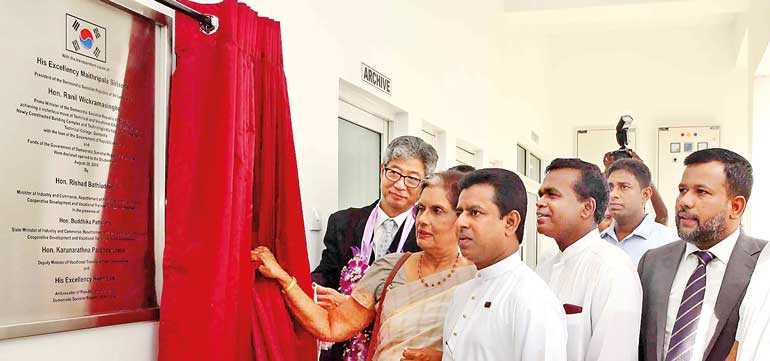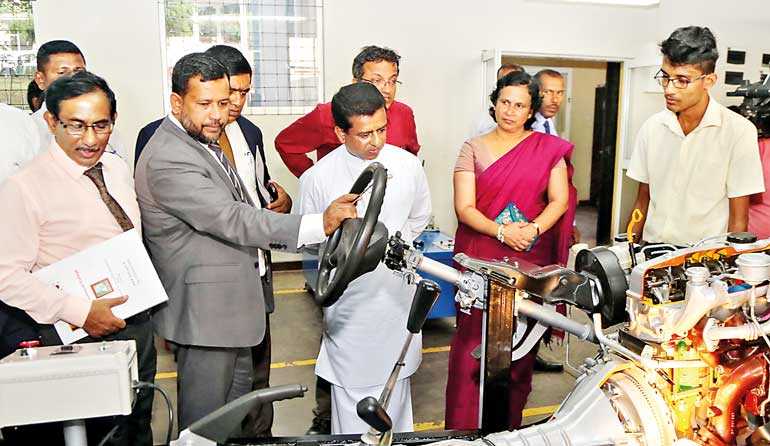Sunday Feb 22, 2026
Sunday Feb 22, 2026
Monday, 2 September 2019 00:18 - - {{hitsCtrl.values.hits}}



Sri Lanka’s State-run job skills-training apparatus, the Technical, Vocational Education Training (TVET) sector, is now poised to receive its largest project funding in its history. Once agreements are finalised, a $50 million facility is set to spawn a fully-fledged Ocean University in Sri Lanka. Nine new hi-tech training facilities across the country are also to be set-up, modelled on the lines of the ground-breaking and ultra-modern South Korean backed KTEC Training Centre unveiled in Orugodawatte as recently as 21 August.
“Today, I met PM Ranil Wickremesinghe and we discussed how to create more modern TVET training centres in Sri Lanka. We decided to set up nine more new centres similar to the recently-launched Korea-Sri Lanka National Vocational Training Institute in Orugodawatte with South Korean funding. We thank the people of South Korea for this valuable support,” said the Minister of Industry, Commerce, Resettlement of Protracted Displaced Persons, Cooperative Development, Skills Development and Vocational Training (ICTPDPCDSDVT) Rishad Bathiudeen on 28 August at the launch event of the modernised Gampaha Technical College (GTC) in Gampaha.
He was joined at the event by his State Minister Buddhika Pathirana, former President Chandrika Bandaranaike Kumaratunga, Minister of Skills Development and Vocational Training Karunatilake Paranavithana, Minister of Transport Arjuna Ranatunga, South Korean Ambassador in Sri Lanka Heon Lee, and the Country Director of Colombo Representative Office of Korea Eximbank Daekyoo Park.
The GTC, launched exactly 20 years ago, has been modernised by a $4.5 million South Korean loan funding which is part of the second phase of the two-stage $26 million project (the first stage was the Korea-Sri Lanka National Vocational Training Institute launched on 21 August in Orugodawatte). “We are also planning to set up a fully-fledged Ocean University at a cost of $ 50 million. We will be able start work on it in the coming weeks. The Ocean University we have at present is not a fully-fledged institution,” said Minister Bathiudeen and added, “A Sri Lankan industry study last year showed that 400,000 new jobs will be available in Sri Lanka in the next three years in the hotel, tourism and industry sectors. According to a study by the University of Colombo 58% of unfilled vacancies in Sri Lanka are in the apparel sector, 20% in the food industry and 33% in other manufacturing sectors. Therefore, the Skills Development and Vocational Training institutions under my Ministry are working to address this situation.”
Department of Technical Education and Training (DTET) Director General P.N.K Malalasekera said, “The NVQ certifications here include electrical, CNC programming, pneumatics and hydraulics, telecommunications, automobile tech, electronics, secretarial training and language training that are offered absolutely free of charge. The South Korean Government is facilitating Korean language studies and youth completing studies in GTC will have priority for South Korean employment.”
South Korean Ambassador Heon Lee stressed the importance of TVET in development. “In South Korea, in the ‘60s and ‘70s, TVET primarily aimed to provide low-level training to light industries. In ‘80s and ‘90s TVET expanded to heavy industries such as ship-building and electronics. The official direction of the South Korean TVET is to create the fourth industrial revolution for sustainable growth. TVET also has been a cornerstone in the development history of Sri Lanka like it did in South Korea. Hence, I would like to mention that this project, supported by the Economic Development Cooperation Fund (EDCF) of South Korea, is an effort to share Korea’s development experience with Sri Lanka. Eventually, this measure will support the low-income bracket by providing technical training – we shall provide them high quality vocational training, leading to poverty reduction, the primary objective of sustainable development goals.”
The modernised GTC not only has hi-tech courses (such a mechatronics, CNC programming, and hydraulics), but includes several new buildings, eight tech labs equipped with Korean technology, two computer labs, a language lab, a modernised library, many ‘smart classrooms’, as well as many brand-new staff quarters, making GTC an ultra-modern training complex. With so much modern infrastructure, it even surpasses the outlook of some Sri Lankan universities.
Korean and Sri Lankan experts train the youth in this facility who study up to NVQ level 6 in all courses including languages. All the enrolled youth study NVQ courses, up to the final level, absolutely free of charge.